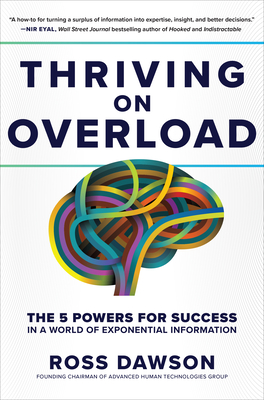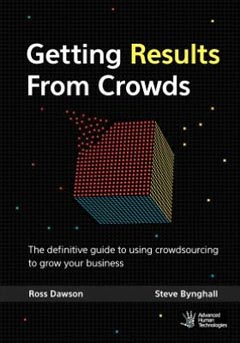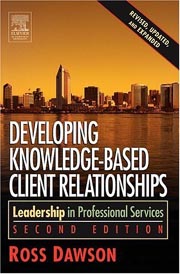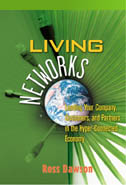
Thriving on Overload:
The 5 Powers for Success in a World of Exponential Information
A leading keynote speaker and motivational consultant, Ross Dawson has published extensively on topics relevant to the information age. His books focus on the future of networking, developing business relationships, and expanding our knowledge of an ever-changing marketplace.

Thriving on Overload: The 5 Powers for Success in a World of Exponential Information is a practical guide for staying ahead of the information deluge that has enveloped the world. Dawson takes us through proven techniques for effectively filtering information and using these skills for making more effective decisions. His book focuses on five significant aspects for developing the cognitive expertise needed to thrive in an expanding information environment, and guides business leaders to effectively apply the insights that have been garnered through this expertise.
Communications technology has become an ubiquitous part of life, providing readily available information resources that have vastly improved our ability to interact with the world at large. These advances have come with a cost, however, as an ever-increasing volume of data and information competes for our attention. Managing this overwhelming flow is a challenge in itself, as we strive to make sense of the information available and to build a positive relationship with it.
Thriving on Overload combines real-life examples, expert advice, actionable steps, and useful exercises to gain traction from the deluge of information that has engulfed our ability to communicate and comprehend. Dawson takes up this challenge with a constructive approach for adopting techniques that maximize personal value from information derived from this vast resource. The recommendations put forward in his book are well structured, and designed to improve our capacity to make available information work to our advantage in all aspects of life.
By cultivating these capabilities, Dawson creates a disciplined approach for managing the flow and interpolation of data communications, as well as identifying a number of habits that should be avoided. His approach is clear, balanced, and designed to enhance our ability to assimilate those information resources which provide the greatest personal benefits. Each of the five principles and techniques recommended in this book are invaluable tools for transforming information overload into effective action; when taken together, they provide all of the skills needed to thrive in this environment.

True to its title, Getting Results From Crowds: The definitive guide to using crowd sourcing to grow your business draws its material from many resources to build a case for implementing a new business model. crowd sourcing covers a large number of successful initiatives operating in an online environment that have transformed the way businesses gather information, develop products, and finance enterprises. Ross Dawson and Steve Bynghall guide organizations through a wide range of techniques for involving external participants in collaborative activities that are geared towards achieving specific business objectives.
While crowd sourcing involves a number of different concepts and definitions, the authors present a coherent and comprehensive guide for successfully applying these concepts in the marketplace. Their book begins by outlining the fundamental concepts of crowds and applying crowd sourcing as a business strategy. This is followed by a discussion of how external resources add value to businesses and also how they affect existing organization and methods. The accessibility of crowds in a service marketplace is examined in detail, covering all of the key issues involved with engaging and leading external resources. The roles of crowd participants and their relationship with ongoing business operations are clearly defined, together with guidance for preparing an initial project scope and definition.
The emergence of crowd funding is discussed in relation to the technologies and platforms that are currently deployed to bring interested investors together with new ventures. The effect of these technology platforms in the creation of new methods of equity and project funding is evolving rapidly. The topic is completed with a discussion of additional crowd sourcing activities that extend beyond traditional business practices to include competition platforms, distributed innovation, microtasks, and other methods for creating value. Getting Results From Crowds culminates with a presentation of comprehensive business models that cover marketplaces, platforms, processes, content and products, media and data, services, as well as entire business ventures.
An ever evolving online marketplace provides unique opportunities to explore new business models and new methods for creating value. Crowd sourcing is shown to be an effective means for achieving results by enabling businesses to respond to the increasing demand for online services and to gain access to relevant human resources across the globe. Getting Results From Crowds provides the information needed to succeed in this dynamic marketplace.
Two additional books by Ross Dawson, together with numerous articles published in major business publications, focus on the evolutionary role of knowledge in business.

The second edition of Developing Knowledge-Based Client Relationships presents a comprehensive range of case studies from professional service firms in industries such as consulting, investment banking, law, and advertising, to illustrate how organizations can develop intimate and profitable knowledge-based relationships with their clients.
This collection of practical studies describes how to create value for clients with information and knowledge and how to develop profitable and enduring client and customer relationships in the knowledge economy. It covers the practical challenges and difficulties faced by professional services organizations in applying knowledge management principles, while offering a meticulous analysis of the critical factors which define successful business relationships. "A must read for all whose survival hinges on their ability to successfully convert transaction-based interactions into comprehensive long-term partnerships with their clients."
Dawson examines key client programs, and how to create deeper knowledge-based relationships through these. He discusses in detail the collaborative technologies available today and how they can be used in client relationships, along with managing portfolios of communications channels. He also discusses firm-wide relationship management, leading relationship teams, and value-based pricing for knowledge-based client relationships. This is done by presenting underlying theoretical framework, a variety of tools for structuring relationships and presenting knowledge to clients, and numerous case studies and examples of firms which have implemented these concepts successfully.
Developing Knowledge-Based Client Relationships shows organizations how to lead their key clients into lasting, profitable, high-value relationships. Building on the powerful, tested principles of knowledge-based client relationships, Ross Dawson provides clear and extremely practical approaches for all professional and knowledge-based firms on how to create unique value for both clients and themselves. Detailed case studies across a wide variety of professional services industries offer valuable insights into world leading practice in the field.

In Living Networks, Ross Dawson shows how to lead organizations that leverage living networks as the most powerful source of new business value. He demonstrates how to use living networks to deepen relationships with customers and partners, promote "distributed innovation," and accelerate the creation of profitable new products and services. Finally, he shows how individuals can plug into living networks to liberate themselves from conventional organizations, earn more money, and achieve greater personal satisfaction. The book is featured on its own web site at: www.livingnetworksbook.com.




